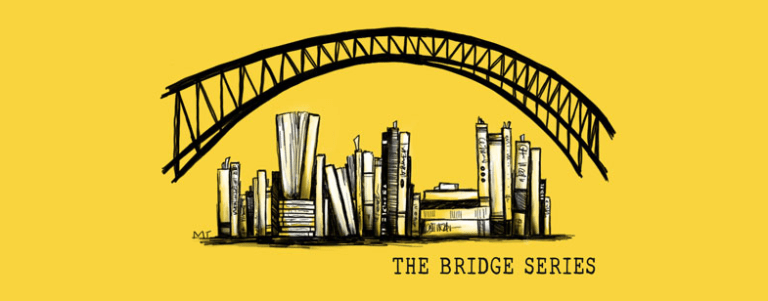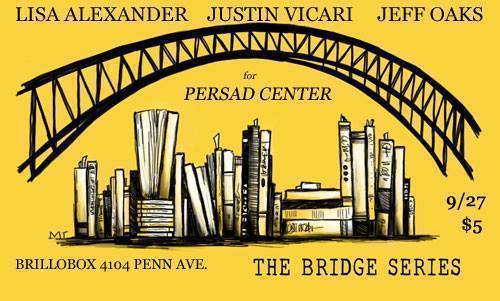The Bridge Series is a new series uniting the Pittsburgh literary and activist communities to raise awareness and funds for local organizations fighting the good fight in these troubling times. The series convenes the last Wednesday of each month at Brillobox and each installment will feature Pittsburgh’s finest writers and a special guest organization, with proceeds from the evening going directly to that organization.
The September 27th installment of The Bridge Series featuring the writers Lisa Alexander, Justin Vicari, and Jeff Oaks—and the guest organization for the evening Persad Center—was curated by writer and Bridge board member Joan Bauer.
Joan E. Bauer is the author of The Almost Sound of Drowning (Main Street Rag, 2008). Since she began writing poetry again in 2001, more than 180 of her poems have appeared in journals, anthologies and periodicals, including — most recently — Calyx, Chiron Review, Cider Press Review, Paterson Literary Review, Pittsburgh Poetry Review, Slipstream, Uppagus, US 1 Worksheets, Voices from the Attic, and Vox Populi: A Public Sphere for Politics & Poetry. For some years, Joan worked as an English teacher and educational counselor and now divides her time between Venice, CA, and Pittsburgh, PA where she co-hosts and curates the Hemingway Summer Poetry Series with Jimmy Cvetic.
How does writing relate to activism? How has activism influenced or affected your writing?
There are writers who see themselves as activists, and others who do not. I think there are many people who help bring about social change through their writing, through community building, through individual acts of generosity and engagement who may not see themselves as activists at all.
I’m reminded of the words of Saul Alinsky: “True revolutionaries do not flaunt their radicalism. They cut their hair, put on suits and infiltrate the system from within.” Of course, not everyone will agree.
I grew up in Los Angeles and was part of the anti-war movement while I was in grad school at UCLA. I did a lot of public speaking about the Vietnam War in churches, synagogues, high schools, community centers, you name it. Then I went to work as a teacher and counselor for more than thirty years.
I had written poetry in high school and I’d always read a lot of history. I only went back to writing poetry in 2001. All those years of teaching and reading, as well as my involvement in the anti-war movement, helped shape the poetry I write now. If you read my poetry, you’ll find it often has a historical base, and a not-so-hard-to-miss political point of view.
What are the goals of The Bridge Series? How does it fit into the local literary scene?
I am very grateful to Kristofer Collins and Jason Baldinger for founding The Bridge Series and to everyone involved. The goal is is, as stated, is to raise awareness about and funds for the Pittsburgh’s non-profits. All of us are learning about organizations that we may not have known all that much about previously. Working “local” makes sense. We’ve had political and other fundraisers in the past, but the depth of this commitment and the energy behind it are really impressive.
Why did you invite Persad Center to be the guest organization this month? Tell us a little about their mission.
Persad was founded in 1972 by Dr. James Huggins and Randall Forrester. Since then, it has been transformative in providing professional, culturally-affirming counseling and psychiatric services for Lesbian, Gay, Bisexual, Transgender, Queer/Questioning (LGBTQ) and HIV+ people in Pittsburgh. The services are affordable and available to individuals, couples and families. There are also training and advocacy programs including a Safe Schools Project and more. I have friends who have greatly benefited from Persad’s programs and services, and I was lucky to have known Persad’s co-founder Randy Forrester in my years on the board of the Greater Pittsburgh ACLU. I am happy that this event has come together as part of the Bridge Series. For more on Persad go to www.persadcenter.org.
Is there a particular writer, book, or poem that has influenced you as a literary activist that you’d like to shine some light on?
In my younger years, I was especially influenced by the writing of George Orwell, Joan Didion, James Baldwin, and Tom Wicker. A book I’d suggest now is Joseph Brodsky’s Less Than One: Selected Essays. You’ll find included Brodsky’s close reading of W.H. Auden’s poem, “September 1, 1939“. I really admire Brodsky for his stoicism and humor, his analysis of political systems, and it’s a great pleasure to read about his friendship with Anna Akhmatova.
What advice would you give to local writers who want to have their voices heard?
Read a lot. Find yourself some poetry friends. Show up. Share your poems. Maybe find a non-profit to be involved with. Tutor a refugee, work a hotline, or join the board of a local organization. There are lots of ways to have your voice be heard.
What do you hope the audience will walk away with after this event?
Lisa Alexander, Justin Vicari and Jeff Oaks are gifted and amazing poets. I hope everyone will walk away, after a great night of poetry, with a sense of the crucial work Persad does, and let others know as well. There may be someone you know whose life could be greatly enhanced by the supportive community and professional services Persad provides.


























